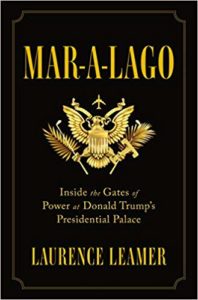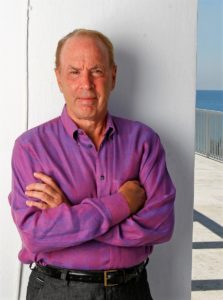Larry Leamer’s Mar-a-Lago: Inside the Gates of Power at Donald Trump’s Presidential Palace (Nepal)
 Mar-a-Lago: Inside the Gates of Power at Donald Trump’s Presidential Palace
Mar-a-Lago: Inside the Gates of Power at Donald Trump’s Presidential Palace
Larry Leamer (Nepal 1965-67)
Flatiron Books
304 pages
January 29, 2019
Kindle $14.99, Hardback $18.29
Where Trump Learned to Rule
To know Donald J. Trump it is best to start in his natural habitat: Palm Beach, Florida. It is here he learned the techniques that took him all the way to the White House. Painstakingly, over decades, he has created a world in this exclusive tropical enclave and favorite haunt of billionaires where he is not just president but a king. The vehicle for his triumph is Mar-A-Lago, one of the greatest mansions ever built in the United States. The inside story of how he became King of Palm Beach―and how Palm Beach continues to be his spiritual home even as president―is rollicking, troubling, and told with unrivaled access and understanding by Laurence Leamer.
In Mar-A-Lago, the reader will learn:
- How Donald Trump bought a property now valued by some at as much as $500,000,000 for less than three thousand dollars of his own money.
- Why Trump was blackballed by the WASP grandees of the island and how he got his revenge.
- How Trump joined forces with the National Enquirer, which was headquartered nearby, and engineered his own divorce.
- How by turning Mar-A-Lago into a private club, Trump was the unlikely man to integrate Palm Beach’s restricted country club scene, and what his real motives were.
- What transpires behind the gates of today’s Mar-A-Lago during “the season,” when President Trump and assorted D.C. power players fly down each weekend.
- In addition to copious interviews and reporting from inside Mar-A-Lago, Laurence Leamer brings an acute and unparalleled understanding of the society of Palm Beach, where he has lived for twenty-five years. He has written an essential book for understanding Donald Trump’s inner character.
Biography
 Early on in my life I decided that I wanted to experience as many kinds of lives as I could. I went to Antioch College, which had a work-study plan. I worked in several places including the What Cheer, Iowa Patriot-Chronicle, a factory in France, and educational television in Boston. After graduating, I joined the Peace Corps and was one of the earliest volunteers to Nepal where I had a remote placement two days walk from a road.
Early on in my life I decided that I wanted to experience as many kinds of lives as I could. I went to Antioch College, which had a work-study plan. I worked in several places including the What Cheer, Iowa Patriot-Chronicle, a factory in France, and educational television in Boston. After graduating, I joined the Peace Corps and was one of the earliest volunteers to Nepal where I had a remote placement two days walk from a road.
After two years in the mountain kingdom, I was awarded a Ford Fellow in International Development that I used at the University of Oregon. I started writing magazine articles with enough success that it led me to an International Fellowship at the Columbia University School of Journalism. Upon graduation I spent an immeasurably unhappy year as an associate editor at Newsweek. That convinced me that I didn’t want a boss, and bosses didn’t want me. That period was the end of the golden age of literary journalism and I began writing magazine articles for many publications including Harper’s, The New York Times Magazine, New York, Playboy and the Washingtonian. I worked incognito in a West Virginia coal mine where I broke my finger and wrote a piece that my agent sold to Harper’s. That led to an assignment covering the war in Bangladesh for Harper’s. That article won a citation from the Overseas Press Club for “Best Magazine Reporting.”
I couldn’t write quickly enough to make a living in the declining world of general interest magazines, and I turned to books. My study of the power players in the capital, Playing for Keeps in Washington, was named a notable book of the year by the New York Times. In 1979 I moved to Peru where I got to know one of the biggest drug dealers and wrote a novel, Assignment, about the cocaine traffic. Back in the United States I wrote Ascent: The Spiritual and Physical Quest of Willi Unsoeld, a biography of the man who climbed Everest in 1963 and had been the director of Peace Corps Nepal when I was there. Robert Redford and Columbia purchased the book for a movie that was never made. Ascent was reissued in paperback a few years ago.
I have many talented friends who can barely make livings writing books. I’ve been fortunate. I’ve had a number of bestsellers starting with my book on the Reagans, Make-Believe: The Life of Nancy and Ronald Reagan. My bestseller, King of the Night: The Life of Johnny Carson, is generally considered the definitive portrait of the late star and has been reissued in mass paperback. I suppose I’m best known for my trilogy on the Kennedys, The Kennedy Women, The Kennedy Men and Sons of Camelot. My biography of Arnold Schwarzenegger, Fantastic, led me to living in LA for a while. My book on Palm Beach, Madness Under the Royal Palms, was another New York Times bestseller and a highly controversial book.
My book, The Price of Justice , was published to some of the best reviews of my career in 2013. It is the story of two lawyers’ struggle against Don Blankenship, the most powerful coal baron in American history. Blankenship was indicted and sent to prison. People in West Virginia will tell you it would not have happened without The Price of Justice.
The Lynching: The Epic Coutroom Battle That Brought Down the Klan, was on People and Orpah’s list for the best reads of the summer. Tavis Smiley named it one of five must reads for the summer.
The President’s Butler, was a satirical novel about the improbable rise of a New York businessman to the White House told through the eyes of his butler. I know both Trump and his butler, but the book is decidedly a work of fiction.
My newest book–Mar-a-Lago: Inside the Gates of Power at Donald Trump’s Presidential Palace–is written with all I know about Palm Beach after living there for a quarter century and all I know about politics and human personality after a lifetime as a writer. I am extremely excited about this new book.
I am blessed in having such a great wife, Vesna Obradovic Leamer, who takes care of everything else in our complicated lives. I’m fortunate as well in having a terrific daughter, Daniela Mantilla, a great son in law, Antonio, and two dynamite grandkids, Alejandro and Emilia. It doesn’t get much better and if Mar-a-Lago is a big hit that will be a cherry on the sundae.
Bravo! Thanks for sharing your highlights and exposing more of the political world through your many volumes. Is Genevieve Gilles in your Palm Beach book?
Abrazos…
Congratulations on your significant body of work. I look forward to reading several of these. By the way, I’m sure that I knew you when studying at Clarence Thurber’s Institute for International Studies and Overseas Administration at UoO , 1967-68ish.
You certainly took the road less traveled over you career. It would be nice to catch up. I can be reached at robjant@comcast.net ……..namaste, Rob Thurston
I wish so much that Larry Leamer would turn his talents on looking at what happened to the Peace Corps, directly after the assassination of Kennedy. The agency was barely two and half years old when Kennedy was killed. It was not done, it was barely begun.
So many of the early Peace Corps major staff were combat veterans of WWII. They were not the generals, then, they were the soldiers in the field. All soldiers are trained that when the leader is killed, the next in line of command takes over, no grieving, the mission goes on. I think that is what happened at Peace Corps, initially. The minutes of the regularly scheduled Monday morning on November 25th, show this so well. There is a note that Shriver is excused because he is attending a funeral. There was a request from a Peace Corps applicant to retake the Peace Corps test. He argued he took the test at a Post Office in Philadelphia the day after Dallas and was too upset to concentrate well. His request was denied.
In early February, less than three months after the assassination, Shriver assumed the monumental task of initiating Johnson’s
Office of Economic Opportunity and agreed to work only part-time at Peace Corps. It would be like Eisenhower deciding on semi-retirement after D Day and saying he would be available only on a part-time consultation basis for the rest of WWII.
Then, there was the ugly tension between Senator Robert Kennedy and President Johnson, reflected in Peace Corps staff loyalities. Who stayed, who left and why and when? Who were the replacements?
I only know what my own experience was as a new Volunteer, far away from DC, during that transition time. I have only read a very little about what was happening in DC, but I think it was significant. At least, it should be documented for history.
February 8, 2019. During times of universal deceit, telling the truth becomes a revolutionary act